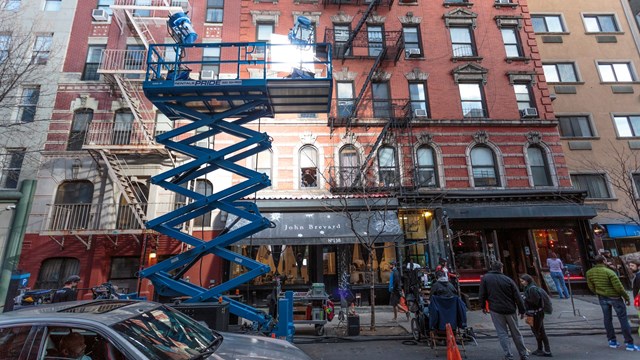
On last season’s “The Apprentice” reality show, celebrities volunteered their time to team up and compete, not for a job with the Donald Trump organization, but to win a large donation to their favorite charity. The show’s concept is to win tasks and prevent hearing the infamous words, “You’re Fired!” from Donald Trump.
Throughout the weeks, two contestants, Piers Morgan (from “America’s Got Talent”) and Omarosa Manigault-Stallworth (a professional reality show contestant) battled both in and out of the board room, completing tasks and launching heinous verbal attacks on each other. Although Piers played the game viciously, it was Omarosa who kept to her reputation of being one of the most hated reality show contestants in the history of television, noted for her extremely personal verbal assaults on fellow contestants (which included below-the-belt comments about Piers and her family). Although such toughness might be forgiven if her tasks were done well, on the contrary, the bossy, and often childish, Omarosa demanded her own way, yet frequently failed at the jobs given to her. She was ultimately, and thankfully, fired.
Can you imagine having someone like this as a board member? Or perhaps this sounds like a board member you already know? We hope not, but unfortunately, when it comes to board members, Forrest Gump might be right when he quoted his mother as saying, “Life is like a box of chocolates, you never know what you’re going to get.”
After all, board members are volunteers—people who give up some of their free time to devote to the upkeep and responsibilities of the building. They each come with a personality and opinions. And until the meetings are underway, you never truly know what kind of board member that person is going to be. While most board members are hard-working, cooperative people, occasionally you’ll have a board member, like an Omarosa, who makes the whole process extremely difficult. What then?
Mona Shyman, vice president of the Federation of New York Housing Cooperatives and Condominiums (FNYHC) in Forest Hills has seen her share of Omarosas. “They don’t want to listen because they think just because, for example, they ran their own business, they can run a building with millions of dollars and the personalities of 300 families,” she says. “They don’t want to learn and don’t want to take constructive criticism.”
But before you can determine how bad your board member might be, what makes a good board member? “Serving ona Board of Directorsis a responsibilityand privilegethat must be undertaken and performed with the highest level of personal integrity and corporate accountability,” says Edward Andron, vice president and director of management at Leebar Management Corp. in New York City. “Each member of the board and each corporate officer must act with the best interests of the corporation as a goal.”
Each board member must also follow the building’s rules—bylaws, the proprietary lease and the house rules. If there is an issue that arises that isn’t covered in these documents, it doesn’t mean that the board member can do what he or she chooses. According to New York State law, the Business Corporation Law (BCL) is the main New York State law which governs how co-op corporations must operate. But the reality is that not all board members care about following the rules.
Take the board member that overuses their power, for example. Laura Ward, a former condo owner in Marietta, Georgia, once had a board member on the association that nitpicked everything with absolutely no leeway.
“[One example was when] my next door neighbor decided to put a [decorative] glass storm door at his front door. He went to great lengths to ensure that it was white [like the trim on the units] and even found one that had a French door effect that looked like several different panes matching the windows that were on every unit,” she says. “Our infamous board member decided it was against policy and made him remove it only to be replaced with one that had no decoration.”
In one Cincinnati development, one anonymous condominium owner told her tale of woe when her development’s president and treasurer convinced other board members that he could handle the responsibilities sans any help from the other members. In addition to various strange security incidents that took place on the property, the condo owners firmly believed that the president failed to pay his own management fees or show paperwork that proved the management fees were paid. These were clear violations of bylaws that required that this paperwork be shown when requested.
For the last five years, Christine White has been on an association board that manages almost 1,600 homes. In her experience, she classifies “bad” board members such as these with her own system. “There are the WIIFMs (What’s in it for me) and the Idiots,” says White. “The WIIFMs get on the boards because they have an axe to grind or a pet issue they want to promote. The idiots either get roped into it by some well-meaning neighbor, or they think they know everything and actually know nothing. All are equally bad, bad. To be a good board member, you have to be able to set your personal biases aside, be willing to learn and listen, and think about the good of the whole community. Many folks find that very difficult.”
Meredith Gardner, Ph.D., president and founder of the management consulting firm The Strategic Edge in New York, agrees that board members come to the table with their own personalities and, sometimes, their own agendas.
“There’s the self-righteous know-it-all, black-or-white communication style person who looks for everything that’s wrong,” says Gardner, who has also sat on her building’s co-op board at one time.” The building is seen through a glass half empty. No one or anything is good enough. There’s the perfectionist—a controlling, intimidating, retaliating volatile person. There’s the bossy type and there’s the pushy recognition hungry person who wants all the attention. They’ll produce results at all costs.”
Andron explains that good judgment and respect for other board members (and shareholders) is just as important as financial acumen and critical analysis of corporate finances.
“A director that cannot work with the other members of the board on a regular basisand, to the contrary, antagonizes and frustrates the efforts and actions of the other members should not serve or be re-elected,” he says. “In addition, personal information conveyed to or discussed by the board in furtherance of their work and efforts on behalf of the coop and its shareholders should not be made public. A breach of confidentiality with respect to one shareholder is a breach that affects all shareholders and weakens the legitimate authority of the board to carry out its mandate of operating the building fairly and with concern for the privacy of its shareholders.”
He also explains that not only must directors act fairly and reasonably with the other members of the board; they must also treat the employees and managing agent with a high level of professionalism and responsibility.
“Publicly criticizing staff members in a mocking mannerincluding the managing agentas a glorified janitor and rent collectoris clearly a violation of even the most minimum requirement of courtesy and fair dealing,” he says.
So, what do you do if one of your board members falls into these categories and you want them removed? Well, if you were Donald Trump on “The Apprentice,” you can simply utter the words, “You’re Fired” (don’t forget to point your finger!) and out they go. Unfortunately, Hollywood is far removed from the land of co-op and condominium living, but there are bylaws in place that will dictate exactly how the removal of bad board members needs to be handled. In most cases, getting them out is done the same way they got in—by vote.
Before you do so, however, consider having a talk with the difficult board member, explaining to them what it is they are doing wrong. “If there is a ‘bad’ board member and it affects your living situation, it depends on the person and your personality, but it may be worth trying to win them over and befriend them but that is asking a lot!” says Deanna Kory, a senior vice president and associate broker at the Corcoran Group in New York. Sometimes, this might be enough. In other cases, it might not be.
“The annual shareholder election is the time of year to make a statement about the actions that will not be tolerated by the thinking women and men who reside inthe building andintolerance, indiscretion, name calling and harassmentwill not be tolerated,” says Andron. “When you have the ability to vote for a new board,choose cooperation, dignity and respect for others. The results of the proper choices at election time will allowyou to move forward for the benefit of all shareholders.”
Our anonymous condo owner did just that when wanting to get rid of the board president. “I’d only lived there a short time, but had had enough and secretly gathered the residents and kicked him out (and his management property) at the annual meeting,” she says. “It was a pleasure to remove him from office.”
To remove one of their unwelcome board members, Laura Ward’s association got a little creative. At holiday time, the board member was adamant that all units should only display white lights for uniformity. After checking the covenants and determining there were no laws about holiday lights, the frustrated board members responded by putting up as many colored light decorations as they could.
“It actually was a really fun time decorating that year because we just all went crazy. Best of all, her next door neighbor found colored lights that not only flashed, blinked, and strobed but played carols right along with it,” she explains. The board member removed herself from another term at the annual meeting.
A board member can also be impeached, explains Shyman. “Generally there has to be a two-third, or 75 percent of the shareholders to sign a petition. An officer of the board can be stripped of his title but can’t be put off the board until you have a new election. An impeachment should be done through an attorney who will put it through the management company, unless it’s self managed and then it goes to board/management company.”
The Federation can also be a resource to any condominium or co-op board that is having difficulties with board members. Reach out to them at the Federation of New York Housing Cooperatives & Condominiums, 61-20 Grand Central Parkway, Suite C1100, Forest Hills, NY 11375, email info@fnyhc.co-op, call 718-760-7540 or visit their website at www.fnyhc.org.
Lisa Iannucci is a freelance writer living in Poughkeepsie, New York.






2 Comments
Leave a Comment